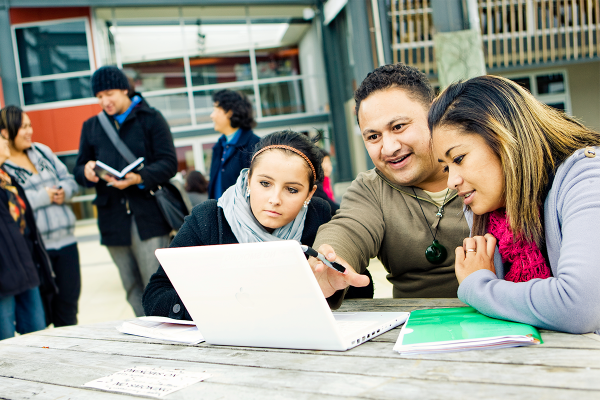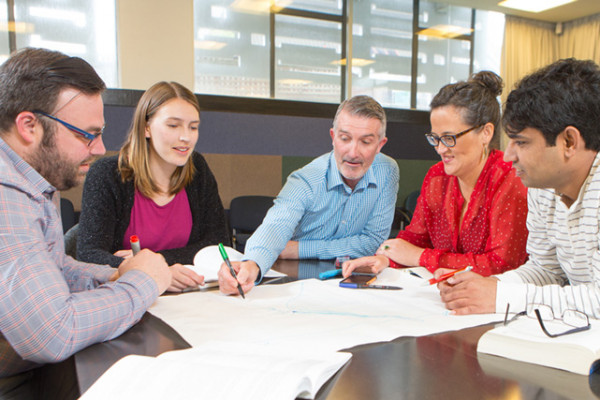2024 Webinars
This page provides an overview of the range of topics presented by the Manako Programme webinars in 2024.
February | The Tapatoru programme – Transforming tertiary educators in New Zealand
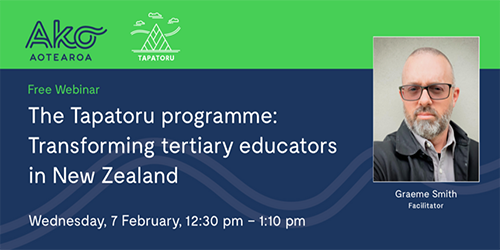
Graeme Smith from Ako Aotearoa’s Manako team introduced the Tapatoru Programme and its role in enhancing the capabilities of tertiary educators in New Zealand.
In this session, Graeme guided educators and managers through the Programme’s journey, highlighting its origins in Māori and Pacific cultural values and its evolution into a key driver of inclusive educational practices. Key focal points include recent achievements, such as the free Tapatoru pathway available on Pathways Awarua, and the significant impact of the Tapatoru Professional Practice Award on improving educator teaching practices.
Graeme also outlined the Tapatoru team’s plans for the future, centred around fostering an inclusive, learner-focused educational environment.
Graeme Smith is a Professional Learning and Development Consultant with Ako Aotearoa’s Manako team. He specialises in integrating effective practice including cultural values into educational frameworks, contributing significantly to innovative programs like the Tapatoru Programme. Known for his dynamic teaching style and deep understanding of educational trends, Graeme excels in transforming complex ideas into actionable strategies for educators.
March | Engaging construction apprentices in the online environment
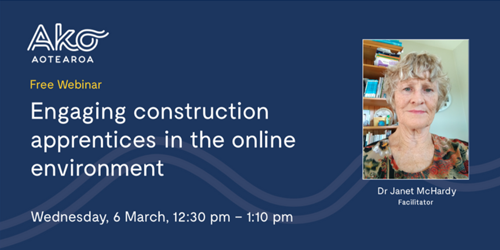
Digital technologies have revolutionised the way we receive and use information. A recent study suggests around 20 per cent of the adult population in Aotearoa New Zealand may have below essential digital skills and lack the skills necessary to operate effectively in the digital space. Digital literacy, underpinning digital skill, does not exist in a vacuum and interacts with general literacy. Without a sufficient level of literacy adults are unlikely to fully meet the challenges in acquiring the digital skills necessary to successfully deal with the modern digital world.
In this presentation, Dr Janet McHardy discussed findings and implications from a recent study of the online engagement experiences of a group of apprentices in the construction industry that suggest learning challenges including less-skilled reading may be barriers to full participation in the online space.
Dr Janet McHardy is an experienced literacy practitioner having worked in various contexts in both Australia and Aotearoa New Zealand over many years. Although a generalist in her practice, much of Janet’s research has been around less-skilled readers and how best to build reading skills. She currently works in the work-based learning environment and is focused on how to support and enhance the learning journey of apprentices. Recent research is focused on the experiences of apprentices with technology enabled training and learning, and ways to overcome barriers for apprentices in this space.
April | New WordFit modules for learners and educators
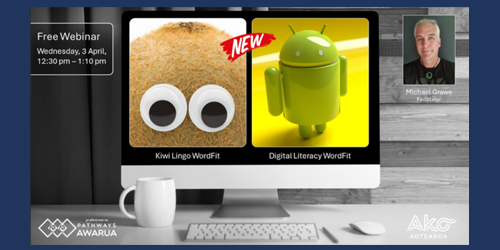
Ako Aotearoa, in collaboration with Pathways Awarua, shared the launch of three innovative WordFit modules focused on ‘Kiwi Lingo’ and ‘Digital Literacy’.
Each WordFit module displays a set of five words at a time. The first screen tests the learner's existing knowledge using image and audio cues. Subsequent screens provide practice through a series of interactions that help the user learn unknown words. These include activities for reading, listening to and spelling the word, finding the meaning, and using the word in sentence.
In this webinar presenter Michael Grawe demonstrated the new modules, showed how users can access them and discussed how they can be used as professional development, and to support learner success.
Michael Grawe, the Professional Learning Manager at Pathways Awarua and a Consultant at Ako Aotearoa, brings a wealth of experience in literacy and numeracy education to these initiatives. With a background in ESOL, Business & Computing education, and advisory roles in Literacy, Language, and Numeracy, Michael is deeply committed to fostering educational success and transformative outcomes for learners and their whānau. His work underscores the transformative power of education in catalysing positive societal change.
June | A Skills Framework for the Food and Fibre Sector
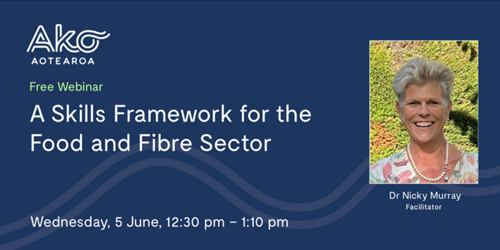
Muka Tangata Workforce Development Council and the Food and Fibre CoVE commissioned a piece of applied research to develop a food and fibre skills framework. This framework aims to articulate the full range of skills across the food and fibre sector, and the connections between them, providing coherency and a common language. This will support clearer learner pathways and help maximise flexibility and skill transferability.
In this webinar, one of the researchers, Dr Nicky Murray, shared the research process and the prototype skills framework, which is comprised of:
- Core transferable skills
- Core technical skills
- Specialised industry and technical skills
- Food and fibre bodies of knowledge.
The research validated a ‘skills-first’ approach and highlighted the need to examine the full range of skills, from foundational through to higher-level complex skills sets. Several other key concepts included the appropriate recognition of te ao Māori in (or around) the framework, the centrality of essential skills, and the idea of a maturity or proficiency progression, which is enabling and learner-centred, rather than a more prescriptive ‘levels’ approach.
Dr Nicky Murray is the Director of On Task Ltd., a vocational education and training and adult literacy and numeracy research consultancy. Nicky has worked and researched extensively across the workplace-based learning sector since 2005, applying her postgraduate and doctoral work in a variety of settings.
July | Rural Australian sporting clubs' influence of youth transitions and aspirations
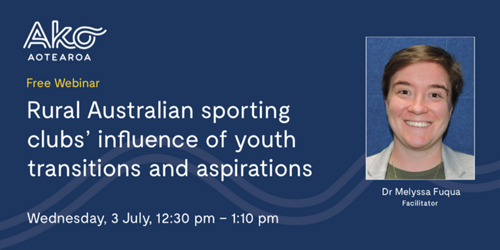
Rural youth tend to face a significant decision at the end of their compulsory education – stay local and join the limited workforce or leave, even temporarily, for further education and qualifications. International literature on rural youth transitions and aspirations has identified that community expectations and a sense of belonging are key influences on post-school decision-making.
This presentation by Dr Melyssa Fuqua unpacked how, in Australia, the institution of the local sporting club (Australian Rules Football and netball) mediates the tensions of the ‘stay or leave’ dilemma, providing a point of stability and connection for their youth. By focusing on the role of the club, this presentation offers new understandings of how these social institutions support young people in post-school transitions.
It is based on an ethnographic study involving two sporting clubs in rural Victoria Australia. The findings develop much-needed knowledge on how social capital around post-school life is transmitted to, and acquired by, rural youth through participation in their local sporting club. The presentation offers further understanding of the complex phenomenon of the ‘stay or leave’ dilemma facing rural youth by focusing on the types of support encouraged by a specific social institution, the sporting club. While the presentation is on an Australian example, sports-focused social institutions are found in many contexts and understanding their role in youth aspirations and transitions to adulthood are vital to the futures of small, rural towns and people.
Dr Melyssa Fuqua is a Melbourne Postdoctoral Fellow in the Faculty of Education at the University of Melbourne. Her research explores how sporting clubs influence aspiration and participation of rural youth in tertiary education and work, and the clubs’ role in their wider community. Originally from Massachusetts, Melyssa was a P-12 teacher in rural Victoria for a decade before returning to higher education and research. Her research interests are rural youth transitions and pathways, community, and social justice.
August | Dyscalculia – Implications for personal finance
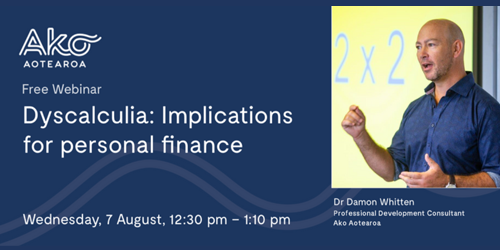
The impact of dyscalculia on various aspects of adult life remains under-researched. This webinar, Presented by Dr Damon Whitten, was a part of an ongoing series, aimed to generate discussion, advance our understanding, and present strategies to improve educational services for adults with dyscalculia.
This webinar delved into the specific vulnerabilities that adults with dyscalculia face when interacting with and managing finances. It will also offered practical strategies for educators and service providers who support individuals with dyscalculia.
Dr Damon Whitten is a specialist provider of professional development to the tertiary sector, focusing on adult literacy and numeracy. He focuses on generating and connecting research to real-world contexts and using the results to develop effective teaching and learning approaches. Damon is at the forefront of adult education and works toward empowering and reengaging adult learners with their dreams, passions and potentials through numeracy and literacy education.
September | Let’s get accessible – Disabled students’ experiences navigating the tertiary education system
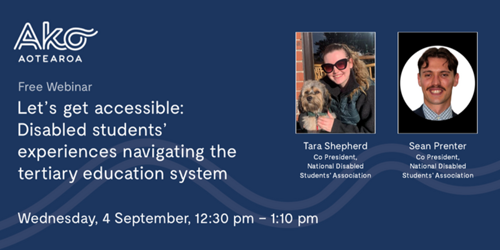
The National Disabled Students’ Association has been assisting with an inter-agency research project focusing on the experiences of disabled learners in tertiary education in Aotearoa New Zealand. The key focus has been to gather qualitative data that authentically represents their voices and lived experiences.
In this webinar Sean and Tara from the NDSA shared their experiences navigating the tertiary education system.
Sean Prenter is Co President for the New Zealand National Disabled Students’ Association and 2022 Co President of the Otago Disabled Students’ Association. Sean has presented research on Cripping Sustainability at Tertiary Institutes at the Global Disability Summit and Australasian Campuses Towards Sustainability Conference and researches accessible urban form. Sean is a New Zealand ambassador for Unite 2030’s New York innovation lab, 2024 Prime Ministers Scholar ambassador to India and is on the youth advisory group for Inspiring Stories. Across these channels Sean engages his pūmanawa of ensuring disabled peoples access, inclusion and dignity.
Tara Shepherd is also the Co-President of the National Disabled Students’ Association (NDSA) and participates in groups like Te Poutāhū Disability Voices focusing on the 2026 curriculum refresh. She’s part of NZ Health Group’s Whakapuāwai taskforce, MoE youth advisory group member and national executive committee member for the Disabled Person’s Assembly (DPA). In her final year at University of Otago, Tara’s the 2024 Welfare & Equity officer for the Students’ Association. Advocacy drives Tara, who aims to foster collaboration, change, and amplify young diverse voices.
October | Trauma-informed approaches in tertiary education
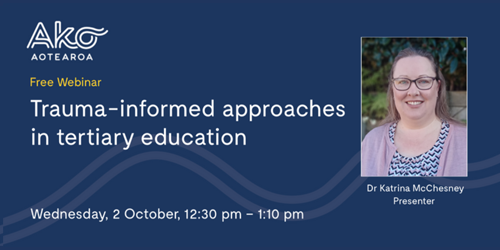
This webinar with Dr Katrina McChesney provided an overview of what trauma is and how it intersects with learning. It considered what is meant by ‘trauma-informed approaches’, why these approaches are important, what they can look like in tertiary education contexts, and how they intersect with other aspects of inclusive educational practice.
Over 70% of people will experience one or more potentially traumatic events in their lifetime. In some cases, these experiences will lead to lasting trauma responses that may have lasting cognitive, physical, emotional, behavioural, and/or existential impacts.
The impact of trauma on learning is increasingly recognized in educational contexts, as is the way trauma often intersects with other categories of social disadvantage. As we work towards aspirations of an inclusive and culturally responsive tertiary education sector in Aotearoa New Zealand, it is important for educators to grow their understanding of trauma and trauma-informed approaches.
Dr Katrina McChesney is a Senior Lecturer and Academic Lead – Tauranga at the University of Waikato Division of Education. Her research centres on inclusive higher education. Her current projects and the postgraduate research projects she supervises explore inclusion for a range of groups who are underrepresented or under-served in higher education in Aotearoa New Zealand and internationally, including people affected by trauma.
November | Art and its connection with learning
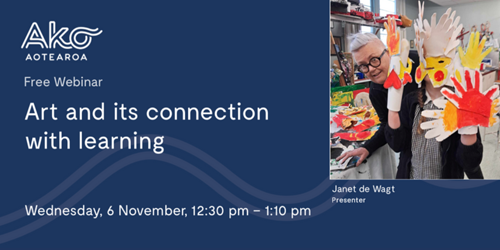
This webinar was presented by artist Janet de Wagt.
Janet's work is underpinned by her belief that everyone is creative. Working in the arts encourages development of abstract thinking, problem solving, persistence and determination. In this webinar Janet talked shared examples of various projects and mahi she has been involved in.
A celebrated, award-winning working artist, Janet is well known for her landscape paintings, painted on location in all weathers and conditions. Her passion is creativity and empowering people to find and develop their own. Janet has worked with thousands of groups of people in many different countries on both large scale and small projects over her working life and has honed her ability to tutor and nurture creativity in a fun and relaxed way whilst responding to the interests and needs of each group. She takes a broad sweep of the arts and is always interested in new ideas and challenges and different ways of working.
‘Creativity involves breaking out of expected patterns in order to look at things in a different way’. – Edward de Bono
Janet's website https://www.janetdewagt.com shows some of the breadth and depth of her work.
About the Manako Programme Webinar series
Each month the Ako Aotearoa Manako programme offered a free webinar featuring subject matter experts around topics that support educators working with adult learners.
